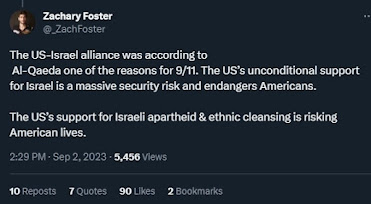I've mentioned
Zachary Foster before. He is an academic who used to come up with very interesting research on the history of the region. But over the past year or so, he apparently got addicted to "Likes" on Twitter for his anti-Israel posts and then went from someone who could look at things somewhat objectively into a troll.
Unlike most anti-Israel trolls, he tries to come up with novel arguments. However, perhaps because he has become blinded by his popularity among the anti-Israel idiots, he has lost any of his previous ability to think.
Last week, Foster proved this twice.
A tweet of his pointed to the Save the Children report
I mentioned last week as having prompted Palestinian children to give the responses that the anti-Israel NGO wanted them to give.
59% of kids in Gaza are self-harming, the highest youth self-harm rate in the world.
The 2 million people of Gaza have lived through 7 wars and 16 years of blockade. An entire generation has never left the strip. Their caloric intake is controlled by the Israeli military. The amount of electricity they consume is controlled by the Israeli military. And so the children of Gaza have the highest self-harm rate in the world, 3X higher than the European average.
This is a perfect example of how an academic favors propaganda over facts.
Israel does not limit food into Gaza at all. At one point, it did, but that policy ended in 2010.
Israel does not limit the amount of electricity into Gaza. Gaza's power plant fuel problems are the result of poor infrastructure and
Hamas/PA infighting.
But after repeating the lies of the anti-Israel crowd, Foster is proud of his finding that 59% of Gaza children self-harm. But even Save the Children's biased report
makes no such claim.
It says "more than half of caregivers reported noticing a trend in harmful coping mechanisms among children and young people, including substance abuse, self-harm (59%) and suicidal thoughts (55%)."
Since the average caregiver (parent) in Gaza has about four children, then the 59% figure should be divided by four to give an estimate of the number of children reportedly engaging in these practices. Which means that Gaza children are probably less likely to self-harm than their European counterparts! (It is possible that more than one per family could engage in such activities, but we simply don't know from the Save the Children report.)
Foster, of course, didn't correct his statistic. That would require intellectual honesty. Instead he went through my timeline to try to find something wrong I may have tweeted. And this is where he apparently came up with a profoundly stupid argument.
I tweeted an
article by Ed West pointing out that, nowadays, Jews in Western Europe have to take many more security precautions to simply go to synagogue than those in the East like Hungary.
the most dangerous place in the world to be Jewish today? You guessed it ...
Israel!
why is Israel putting millions and millions of Jewish lives in danger everyday? And why are you supporting a state that is endagering Jewish lives?
... why do you support endangering Jews? Are you anti-semitic?
The Forward article he linked to notes that more Jews in Israel are killed for antisemitic reasons than in any other country - because antisemitic Arab terrorists target Jews there more than they do in the US or Europe.
Again, this academic shows how his hate of Israel has destroyed his previous ability to think rationally.
The stupidity is breathtaking.
By Foster's logic, since 43,000 British civilians were killed during the Blitz in 1940-1, then Great Britain is responsible for their deaths - not Germany.
The US is responsible for the thousands murdered in the World Trade Center in 2001 - not Al Qaeda.
As I responded, "Call me old fashioned, but I think that the people who want to kill the Jews are the ones endangering the Jews."
The concept that murderers are responsible for murdering is apparently too advanced for anti-Israel Ph.Ds.
But the stupidity goes beyond that. After 1948, and more so after 1967, Arabs attacked local Jews in Morocco, Algeria, Lebanon, Syria, Iraq, Yemen, Egypt and elsewhere - forcing them to leave. Now the antisemitic Arabs attack Jews in Israel, because that's where they are, just as they attack identifiable Jews in Brooklyn and Stamford Hill.
But only idiots and anti-Israel activists could argue that Jews who miraculously still exist in Yemen or Syria are safer than those in Israel.
Successful terror attacks are not the proper metric of security for Jews. The metric is being able to walk around freely wearing a kippah or tichel or tallit without fear. The metric is being able to keep synagogues unlocked. The metric is to be able to walk around with a kippah and not expect to be berated as either Christ-killers or baby-killers or slave owners while on the bus or on campus.
Safety is a state of mind based on everyday events more than exceptional terror attacks. Normal people know this.
But highly educated anti-Israel activists look at the world through only one lens - how to twist any new pieces of information into ammunition, no matter how stupid these arguments are.
|
 Buy the EoZ book, PROTOCOLS: Exposing Modern Antisemitism today at Amazon! Buy the EoZ book, PROTOCOLS: Exposing Modern Antisemitism today at Amazon!
Or order from your favorite bookseller, using ISBN 9798985708424.
Read all about it here!
|

|

 Elder of Ziyon
Elder of Ziyon
































